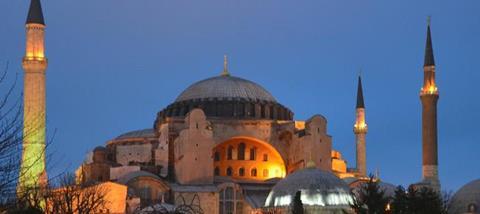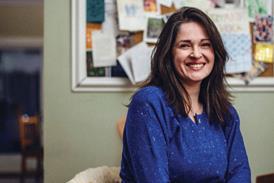
Hagia Sophia in Istanbul: the name denotes ‘Holy Wisdom’ in Greek.
The inside of this domed cathedral, constructed in 537 CE by the Roman Emperor Justinian I, is an iconic reminder of a rich Byzantine Christian history. It has also been for many Christians over many centuries a testimony of Constantinople (modern-day Istanbul) as the New Rome. But in 1453, the Ottoman Turkish Sultan Mehmed II conquered the city and converted the cathedral into a mosque. Five centuries later in 1935, the secular leader of Turkey, Kemal Atatürk, converted it into a museum, a meeting point for East and West and a UNESCO World Heritage site since 1985.
As a Christian Turkish friend wrote recently in his blog 'Requiem for my Hagia Sophia', this building is also in the eyes of many people akin to a palimpsest, whose history has been written, erased, re-written. So whether I look at this building through my own Armenian Christian prism, or whether I also consider it a house of worship for Muslims, let alone a museum, this building is in its essence a holy gift to all humanity - be that Christians, Muslims or aesthetes.
President Recep Tayyip Erdogan of Turkey has recently pushed to restore its status as a mosque, claiming that international pressure to keep it as a museum was a violation of Turkey’s national sovereignty. I understand that Hagia Sophia will open its gates for Muslim worship tomorrow, where some of the the Byzantine Christian mosaics will be covered with curtains during prayer times.
But why did President Erdogan push for a re-conversion 85 years after it had become a museum? Let me moot three points that might help explain his controversial move:
Firstly, Turkey today is suffering from the consequences of the Covid-19 pandemic. Its economy is wobbly and considerably weaker than in years past. It is also involved in foreign adventures in Syria, Libya, Iraqi Kurdistan and the Southern Caucasus. The next parliamentary and presidential elections are due in 2023 and could well happen sooner. All of these factors are slowly eroding President Erdogan’s popularity and that of his AKP party. His decision to re-convert Hagia Sophia into a mosque might be a political attempt at rallying his base by changing the conversation.
Secondly, it could well be that President Erdogan’s strong religious instincts, coupled with his populist demeanour, mean that he is trying to get rid of Kemalism in Turkey, and in so doing also reverting Turkey to a neo-Ottoman era when it was an empire steeped in its religion, its grandeur, its power and ultimately its decline. In a sense, he possibly thinks - in my opinion, mistakenly - that this act will recreate a political narrative that will re-energise his supporters, and lead him triumphantly toward the celebration in 2023 of the centenary of the modern-day Republic of Turkey.
Finally, Christian communities in Turkey consist at best (and I believe this to be an inflation in numbers) 100,000 men and women - largely Armenian Orthodox, but also Greek Orthodox, Syriacs, Catholics and Protestants. They are reluctant to challenge the government and raise their profile. Or else, life might get considerably tougher for them. So the remonstrations by the worldwide fellowship of Christians outside Turkey - their brothers and sisters in Christ - must not be such that they render the lives of these Christians more precarious than they already are. Besides, let us not forget that the conversion was not strictly from a church to a mosque, but rather from a museum, and so the statements might in one sense sound a tad disingenuous to those who already suspect that Christians might be evincing anti-Muslim or anti-Turkish sentiments. Moreover, the protests by states, organisations or individuals will in all likelihood run out of steam soon as other issues crop up, with the result that the Christians inside the country will be left alone to deal with Erdogan’s ire.
Any remonstrations by Christians outside Turkey must not be such that they render the lives of Turkish Christians more precarious than they already are
Does all this mean that Christians - especially us in Europe - should stay mum? Far from it! But we should marry passion with reason, and we should be culturally more sensitive to the words we deploy when we criticise Turkey for its actions. The conversion of Hagia Sophia is not the real address for misfired Islamophobia or anti-Turkish and anti-Erdogan political expostulations. In fact, I would add further that Hagia Sophia should not be about Christian loss or Muslim gain, about chauvinism or triumphalism. It should not be used for underlying political fears or for settling personal scores. Rather, we should all strive to maintain it as a symbol of multi-faith relations, a reminder to the world that Turkey was also a fertile ground for our own Christian biblical history. Surely the events that unfolded there must help solder the followers of two monotheistic traditions let alone weld different civilizational cultures into one holy and wise space - like this cathedral, mosque, museum, and now mosque again.
Sadly, my wish might sound to many ears as being unreasonable, impractical, defeatist, naïve and even outlandish if not also outrageous. Others might suggest that it is also removed from the pugnacious realities of the real world - minus any misplaced idealism. Perhaps so, and therefore one likely consequence of this untimely and ill-advised conversion of Hagia Sophia is that it will result in the scarring of multi-faith relations let alone the further souring of relations with many European countries. Conversely, it will allow Erdogan to feed popular and false misperceptions that portray him as a persecuted leader struggling to revive the glory of Islam.
My question in this blog today is quite basic: did Erdogan really need to do it? I would posit that this latest undertaking by President Erdogan and of his acolytes or advisors was decidedly neither holy nor wise.
Dr Harry Hagopian is an Armenian Christian who hails originally from Jordan. He is an international lawyer who has contributed to the debate on the future of the Holy Land and participated in many of the political and religious meetings in Jerusalem and abroad relating to the Israeli-Palestinian conflict. He has written major treatises on the issue of recognition of the Armenian Genocide, as well as on Women’s Rights in Islam and on Blasphemy / Apostasy legal cases under Common Law principles. He has also published two books, The Armenian Church in the Holy Land (2017) and Keeping Faith with Hope: The Challenge of Israel-Palestine (2019). For more information visit epektasis.net
Premier Christianity is committed to publishing a variety of opinion pieces from across the UK Church. The views expressed here do not necessarily represent those of the publisher






























